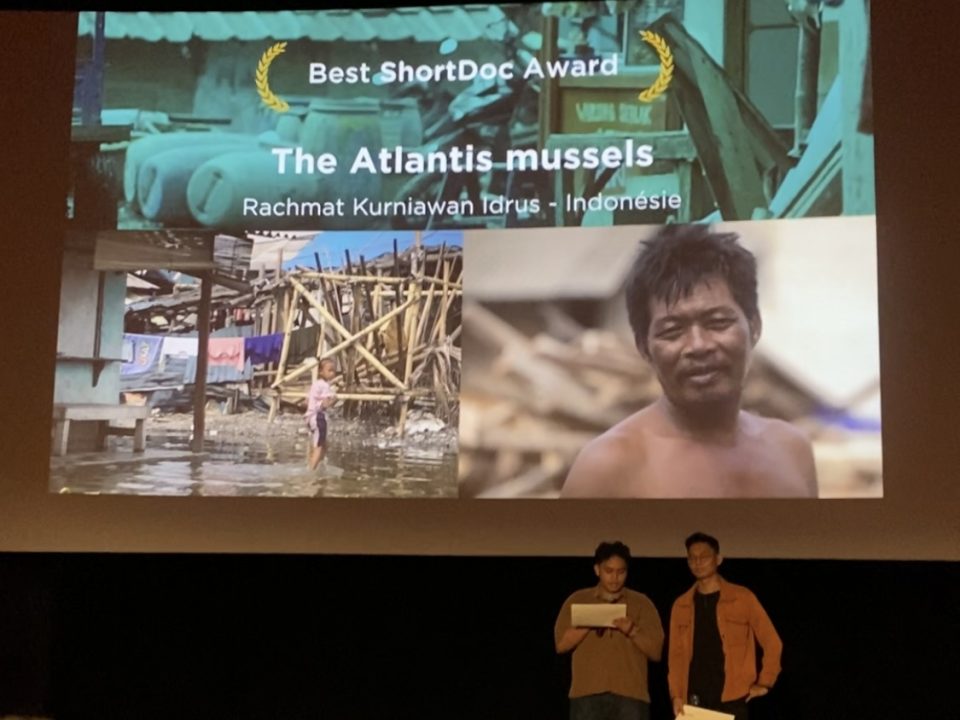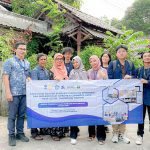
UMN Conducts Community Service Grant: Helping MSMEs Grow Through the Digital World
August 13, 2024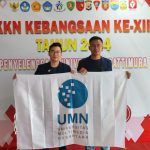
Stories of 2 UMN Students Participating in KKN Kebangsaan 2024: Teaching Business Economics-Multimedia Training
August 13, 2024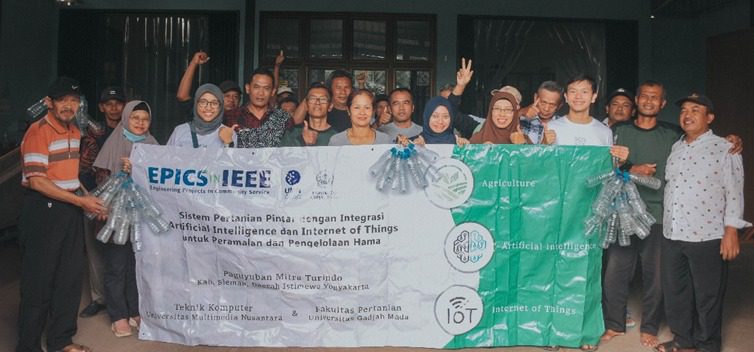
A team of lecturers and students from UMN’s Computer Engineering Program and UGM’s Master of Plant Pest Science Program collaborate to create a smart farming system in Sleman, Yogyakarta. (Doc. Nabila Husna Shabrina)
TANGERANG – A team of lecturers and students from UMN’s Computer Engineering Study Program and UGM’s Master of Plant Pest Science Study Program collaborated to create a smart agricultural system. This collaboration helps salak farmers in Turi, Sleman, Special Region of Yogyakarta, boost the production and export of the native Indonesian fruit.
This project is an International Community Service program that received funding from EPICS in IEEE of USD 5,300 or equivalent to IDR 85,450,310 (assuming an exchange rate of IDR16,122 per US dollar) and matching funds from the Institute for Research and Community Service of UMN (Lembaga Penelitian dan Pengabdian kepada Masyarakat/LPPM).
The changes in temperature, humidity, and rainfall due to the erratic climate have made predicting pest attacks difficult. This is said to be one of the factors in the decline of salak production. The collaboration project between UMN and UGM, which began in January 2024, combines Internet of Things (IoT) and artificial intelligence (AI) technologies to predict and control pest attacks.
“Currently, this program is still being implemented for Mitra Turindo. However, we really hope to expand its implementation to other farmer partners, both salak farmer groups and other farmer groups [other than salak]. We hope this program can become a pilot project that can motivate other farmer groups to utilize this technology,” explained the supervisor and project coordinator of this smart farming system, Nabila Husna Shabrina, S.T., M.T..
Mitra Turindo Salak Farmer Group is one of the communities cultivating salak fruit in Sleman. Nabila admitted that this collaborative program between UMN and UGM helped the partners immensely.
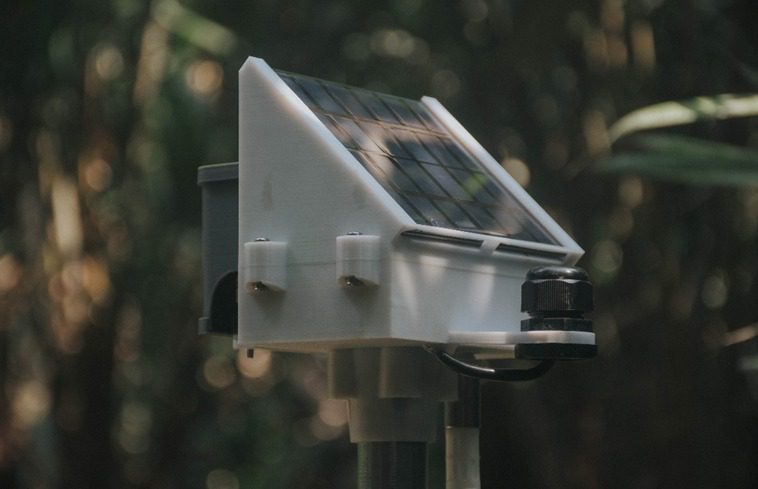
The IoT prototype made by the UMN team was installed in one of the farmer’s fields. (Doc. Nabila Husna Shabrina)
In this project, the UMN team contributes to developing hardware and software for smart agricultural systems, like an IoT prototype that contains temperature, humidity, rainfall, and light intensity sensors. Nabila said that this prototype also has solar panels that function without electricity.
The UMN team then developed an AI method to predict the weather for the next few days and the appearance of pests. Finally, they developed the MySalak smart farming application.
Meanwhile, the UGM team, with expertise in pests and plant diseases, provides agricultural data and analyzes the data obtained from the system developed by the UMN team.
“We are very enthusiastic about the implementation of this program. From an academic perspective, this program provides a different learning experience for students, allowing them to directly apply the knowledge they learn to solve real problems in the surrounding environment. The collaboration with the Faculty of Agriculture UGM also helps broaden our horizons, enriching our understanding of the challenges in the field,” said Nabila, who is currently also actively teaching as a lecturer in UMN’s Computer Engineering Program.
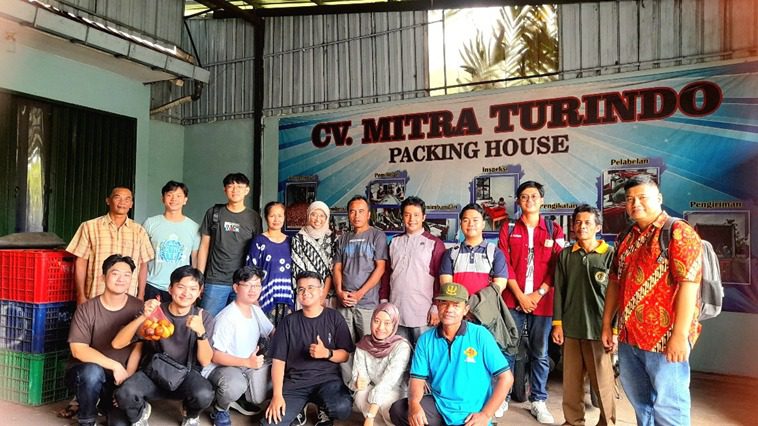
A team of lecturers and students from UMN’s Computer Engineering Program and UGM’s Master of Plant Pest Science Program visited the Mitra Turindo Farmer group to discuss with the farmers about their needs. (Doc. Nabila Husna Shabrina)
At least 11 UMN Computer Engineering students, two student volunteers for documentation, and two UMN Faculty of Agriculture students are involved in this project. Indah Desri Wahyuni is one of the 2021 UMN Computer Engineering students who contributed to helping salak farmers through this project.
In addition to broadening her horizons in the world of agriculture, Indah said that this collaborative project with UGM was fascinating. “It turns out that technology has a big role in the social world, and our computer engineering team can help make it happen,” Indah said.
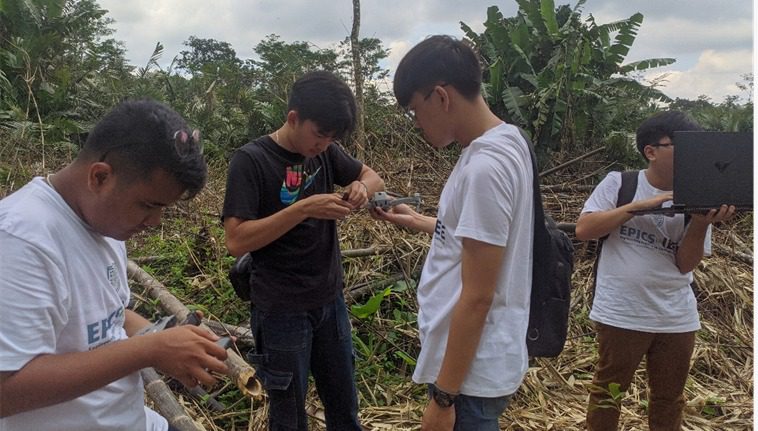
The smart agriculture system project team uses a drone to take pictures and map the salak farmland in Sleman, Yogyakarta. (Doc. Nabila Husna Shabrina)
In the creative process of working on this project, Indah and the UMN team also applied knowledge from several courses in UMN’s Computer Engineering Study Program. For example, “Microprocessor System” teaches about basic systems, “Embedded System” teaches about hardware design, and “Image Processor System” teaches machine learning.
Nabila said the smart farming system project implementation will be completed by the end of 2024. However, she and her team will create a monitoring system to ensure that the system is still running well. In addition, the grantor will also follow up again in the next 1-3 years to ensure the sustainability of the implemented project.
By Melinda Chang | UMN News Service
English translation by Levina Chrestella Theodora
Kuliah di Jakarta untuk jurusan program studi Informatika | Sistem Informasi | Teknik Komputer | Teknik Elektro | Teknik Fisika | Akuntansi | Manajemen| Komunikasi Strategis | Jurnalistik | Desain Komunikasi Visual | Film dan Animasi | Arsitektur | D3 Perhotelan , di Universitas Multimedia Nusantara. www.umn.ac.id



